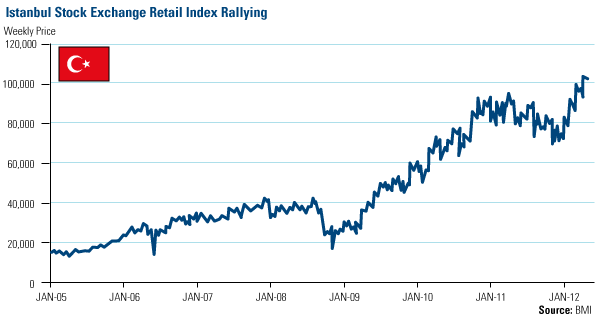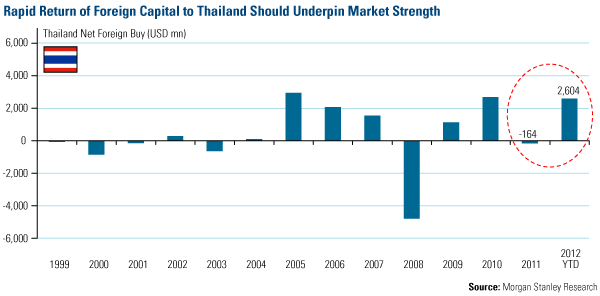Emerging Markets Radar (May 21, 2012)
Strengths
- Despite the escalating crisis in Greece and the wider eurozone, Turkish retail equities have rallied strongly since the start of 2012. In contrast to most global equities, the Istanbul Stock Exchange Retail Index has already surged well beyond its 2008 peak and last month pushed through the high achieved in 2011.

- China’s central bank cut the reserve requirement ratio (RRR) by 50 basis points over the weekend, which creates liquidity for banks.
- China will allocate Rmb 26.5 billion in subsidies to promote the use of energy-saving household appliances and products, which should be positive to the sector.
- Korea’s unemployment rate was 3.4 percent in April, as the number of employed people jumped 1.9 percent in the month.
Weaknesses
- Foreign direct investment in China fell 0.7 percent from a year earlier to $8.4 billion in April, a sixth monthly drop since November last year, which will reduce the amount of pressure for the central bank to buy back foreign currency.
- China’s power consumption, a barometer of economic activity, increased 3.7 percent in April to 389 billion kilowatt-hours, the slowest in 16 months, data from the National Energy Administration showed on Monday. The growth rate was 3.3 percentage points lower than the previous month, and 7.5 percentage points slower than the same period last year. It was the slowest rate since January 2011.
- Renewed uncertainty over Greece's eurozone membership and the potential for severe crisis contagion upon a Greek departure from the monetary union has weighed heavily on the banking sector over the recent week.
Opportunities
- Foreign capital has continued flowing into the Thai equity market this year, reaching $2.6 billion year-to-date in May, according to Morgan Stanley. At the current speed, the total inflow of foreign capital can easily surpass the recent peak of $2.9 billion. Investors are attracted to Thailand due to the expectation of economic recovery from flooding last year.

Threats
- On top of slowed domestic investment growth, both worsened eurozone credit risk and consumption demand negatively affected Chinese economic growth. The Chinese government soon may have to restart stalled infrastructure projects to help economic growth while it is trying to transform the economy by enhancing value-added manufacturing productivity and consumption.









